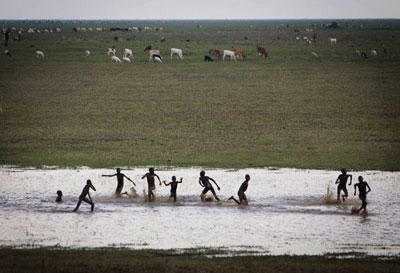Nasir is a southern Sudanese town on the Sobat River in Upper Nile state near the Ethiopian border. During Sudan’s second North-South civil war, which lasted for more than two decades, resulted in the deaths of nearly two million people, and displaced another four million people, Nasir was a key hub for Operation Lifeline Sudan, a major humanitarian effort coordinated by the United Nations that delivered services to the South from 1989 to 1997. The town also served as the base for a significant splinter faction of the SPLA, the southern guerilla army that fought the North in the civil war; Riek Machar, the leader of this splinter faction, is now the vice president of the Government of Southern Sudan.
Today, Nasir is once again in the news due to widespread insecurity and a sharp uptick in violence throughout the South in recent months. In Nasir, the failures of the Joint Integrated Units, or JIUs – military units comprised of soldiers from both the North and the South – have been particularly blatant in recent incidents between two different Nuer clans, the Lou Nuer and the Jikany Nuer. And as I noted in a recent post, not far South of Nasir on the Sobat river, an attack in mid-June by an armed Lou Nuer militia on a World Food Program river convoy carrying U.N. food aid reportedly killed at least 40 of the 150 southern soldiers acting as escorts. The food was reportedly headed to an isolated region of Akobo, in Jonglei state, where 19,000 people had fled. These recent attacks are marked by the indiscriminate killing of women and children, which is a disturbing shift from the historical practices of cattle-raiding and other traditional issues related to land conflict in the South.
Meanwhile, serious food security problems are threatening neighboring Jonglei state, where 16 percent of the population suffers from malnutrition – what the Economist called a “permanent humanitarian emergency” – and the yearly “hungry gap” that occurs during the rainy season is likely to be worse than usual.
UNMIS Regional Coordinator for Southern Sudan David Gressly noted in a press conference last week that, “There are clear grounds for concern about the security situation in and around the city of Malakal, eastern Jonglei State, and the Sobat River corridor where some of the worst clashes have taken place this year.”
The situation in this isolated corner of southern Sudan is dire and does not show signs of improving anytime soon. Here, Reuters photographer Finbarr O’Reilly’s photos from Nasir show the extent of devastation from the recent violence with a focus on its toll on women and children.
As these photos starkly demonstrate, the renewed commitment expressed by the international community and the Sudanese parties to implement the faltering Comprehensive Peace Agreement is desperately needed in the South today; in fact, it was needed yesterday.
(Note: Hat-tip on the title of this post to Eliza Griswold’s excellent article, “Somalia Revisited,” published on the Atlantic Monthly’s site in December 2008.)


